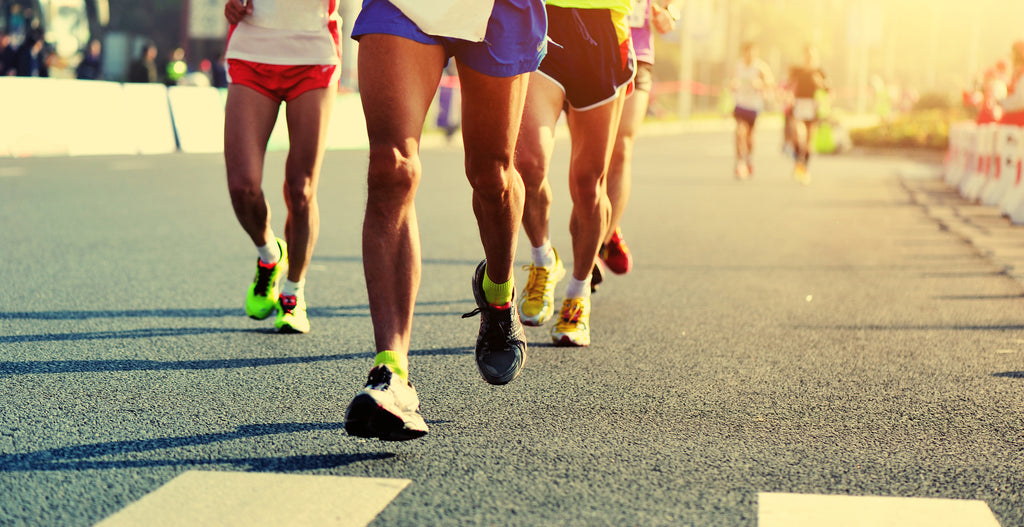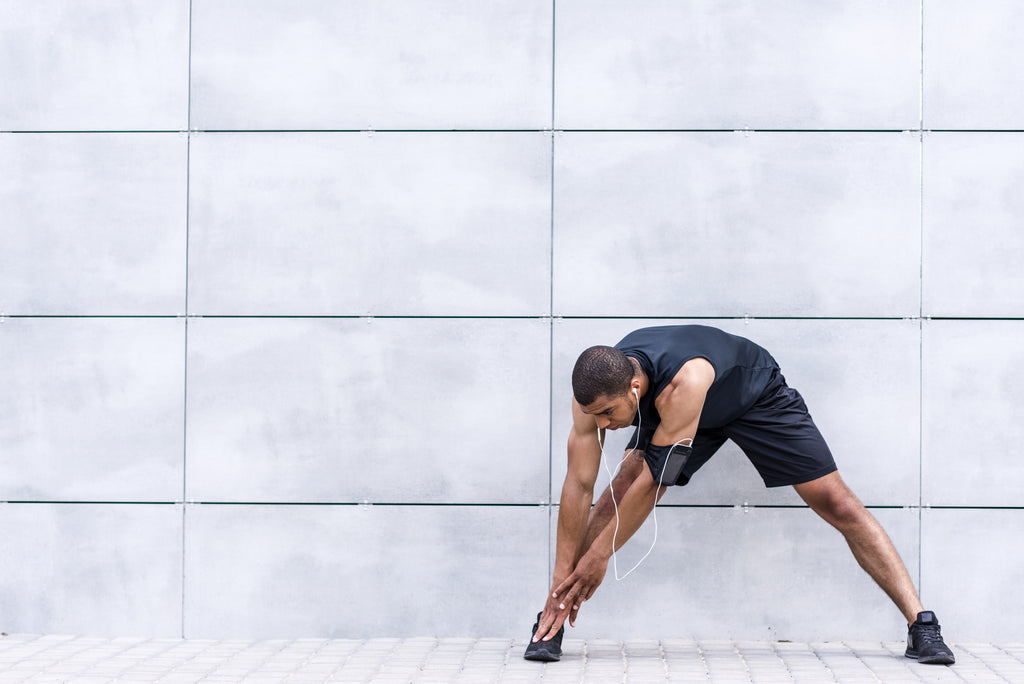A Science-Backed Guide to Running Longer (Without Getting Tired)
This guide explains scientifically proven warm-up, in-run, and nutritional tactics that will help ANYONE run farther, faster, and longer. Most of these simple tips will pay off immediately or within a few short weeks.
Overcoming tired lungs, sore legs, and tight hamstrings is only a matter of patience, effort, and intelligent body science. Are you ready to push harder, run farther, and conquer the pavement, track, and trail?
LET’S DO IT!

READ FIRST: A Note About This Guide to Running Farther and Longer
It doesn’t matter if you’re running your first mile or first marathon, running farther and longer comes down to a few simple principles:
We’ve divided this guide into sections:
If you’re a beginner that wants to break through a plateau and start racking up the miles, follow all of the advice as closely as possible.
There’s nothing more rewarding than smashing through your limits and setting a personal record (Starbucks cold foam ice espresso coming in at a close second).
It’s a lot easier than you think. Here’s what to do:
Ⅰ: How to Warm Up for Better Running Performance
If you want to put your best foot forward (see what we did there?), it all starts hours before you hit the ground running.
Actually, just adding a good warm-up to your run is enough to improve your speed, endurance, and performance. You’ll feel looser muscles, stronger lungs, and a more focused brain.
It’ll increase your body temperature, improve blood flow, boost heart performance, and minimize your risk of injury.
Scientific Consensus: One meta-study of 32 warm-up studies concluded that warm-ups positively affect performance in 79% of all cases [1]. STRETCH!
Start By Walking
Walking is the ideal way to ease your body out of sitting mode and into “it’s time to crush this damn thing” mode. Start your run by walking for 3-5 minutes.
Move to Light Jogging
Now, it’s time to pick up the pace slightly. Ease into a light jog for 3-5 minutes to raise your body temperature and get the blood flowing.
Now Perform a Few Dynamic Stretches
You don’t have to perform yoga in the park (though you’re free to do so) but performing a few dynamic stretches for 30 seconds is enough to improve your running performance, reduce pain, and prevent injuries.
Here are the most effective stretches. Do them and you’ll be halfway to posting an AWESOME run map on Facebook to make your friends jealous:
Pro Tip - Warm up IMMEDIATELY before your workout
Your body temperature plateaus FAST and tends to return to “normal” after about 15-20 minutes [2]. Don’t wait.
Ⅱ: During Your Running Workout
Every runner knows the feeling:
Things start off well. You’re cruising. Each stride more potent than the next. The Earth trembling with terror as your running shoes pound the pavement (did we mention that you should 100% buy running shoes?).
Then you hit it. The wall. Most runners hit the wall head-on and their sessions suffer for it.
Here’s how to tear down that wall and keep running even when your legs feel tired.
Keep Proper Form

Back and head straight (don’t look down), shoulders relaxed, and no tension in the arms or wrists. And remember, always land on the middle of your foot. Landing on your toes will quickly tighten your calves. Landing on your heels means you’re overstriding.
Running technique is intimately connected to running economy (the factors that contribute to your running performance), and proper form has shown to heavily influence multiple running parameters [3].
Pay Attention to Your Breathing Pattern
Create a breathing pattern and stick to it. A simple one that is highly effective—especially for beginners—is to breathe in as your left foot falls, continue breathing on your right, and exhale on your left. Some runners report this little trick alone keeps their gas tank full for miles.
Tip: For more advanced runners, try breathing in only through your nose for the first minute of every mile. When you breathe through your nose, you build stability with your diaphragm and keep your entire body stable.
Set Mini Goals
Ever wonder why those addictive games you play on your phone (damn you, Angry Birds!) keep you entranced for hours at a time? Because mini-goals create an addictive dopamine rush that leaves you hooked and wanting more.
First, get to the next town. Then, achieve the next level and unlock a new power. Next thing you know, you haven’t showered in weeks or paid your mortgage, and your wife has moved back in with her mother and taken the kids with her (damn you again, Angry Birds!).
Setting mini-goals within your run will push you further and further by going a little more each time. Here are a few easy ones:
See how easy that is?
Listen to Music
Music triggers a range of emotions, but blasting Iron Maiden on the track actually has another major benefit: it increases athletic performance.
In one fascinating study, 50 participants were divided into two groups (with music and without. The total exercise duration was much higher in the group that listened to music [4]!
VitaMonk Hack: Stretch During Your Run

This is the ultimate VitaHack that we used to add miles onto our runs back when we just started training. We also use endurance supplements that boosted our stamina big time—more on that later.
About halfway through your run (no matter how long it is), STOP.
Do some dynamic stretches. Air squats and leg swings will help you run for miles and miles. Stop your run, do 10 air squats, catch your breath and keep going. From here on out, stop every mile and do 10 again. Alternate between squats and swings.
Your legs and hips will feel AMAZING.
TIP - Drink More Water. It goes without saying, but drink a pint of water for every 30 minutes of running. It’s water. Don’t be stupid.
Ⅲ: Nutrition For Better Running
You are what you eat is especially true for runners. Getting healthier, fitter, and faster will improve your life everywhere: the track, the bedroom, and the office.
Running nutrition is complicated, but eating a healthy diet is the best way to achieve your fitness goals. Trust us, you CANNOT outrun bad nutrition. Because of the complexity, we highly recommend taking a nutritional supplement to help build endurance, especially for beginners.
Follow these nutritional guidelines, and you’ll be running farther, faster, and longer before you know it.
Eat More Carbs
Research has shown that distance runners should get 50% of their total energy from carbs. This bumps up to 70% for elite runners [5].
Eat more of these foods:
Tip - Carb Load Before Running: Carbs are the gas that fuels your workouts. Two hours before you run, eat a carb-heavy meal. With more carbs, your body will have the fuel it needs to cruise at 65 on the highway instead of putting around in the slow lane. During your workout, Bananas are the perfect high-carb snack.
Increase Protein Intake

Protein is essential for repairing the damage done to your body while running. You should aim to consume .75g of protein per pound of bodyweight. All told, protein should be 15-20% of your diet.
Low-fat proteins are the best: fish, lean meat, egg whites, and chicken.
Vitamins and Minerals
Runners should aim to get as many vitamins and minerals through whole foods as possible. It’s extremely difficult, especially if you’re new to running or running far distances, but try to get as much of these vitamins and minerals as possible:
If you don’t eat a balanced diet and get enough nutrition, no running techniques will help. In fact, your struggles are more likely due to your lack of nutritional balance than anything.
We struggled through the same problems and could never break through plateaus. We tried supplementing and sports drinks, but buying all of those pills and drinking all of that sugar was hard on our wallets and bodies.
That’s what drove us to create the ultimate endurance formula—one capsule complete with everything runners need to push harder, run farther, and recover faster no matter their level.
Enter Endurance Mode
Endurance Mode is the runner’s cheat code we wish we’d had in the beginning. Now, you can have the same advantages as Olympic athletes when you hit the track. Runners, track athletes, and pro cyclists use these same supplements, and we’ve put them all into 1 all-natural capsule.
It’s the first supplement of its kind: all of the benefits for strength and endurance WITHOUT the side effects of sports drinks, synthetics, or fillers.
This is the most complete, all-natural formula on the market:
It also contains heavy doses of cordyceps and ginseng for extra resistance to fatigue and workout capacity.
Ready to run farther than you ever have before? With the right warm-up, technique, nutrition, and supplementation, you’ll set a new personal best every time you hit the track.
References
[1] https://www.ncbi.nlm.nih.gov/pubmed/19996770
[2] https://www.researchgate.net/publication/325972524_Effects_of_Warm-Up_Post-Warm-Up_and_Re-Warm-Up_Strategies_on_Explosive_Efforts_in_Team_Sports_A_Systematic_Review
[3] https://www.ncbi.nlm.nih.gov/pmc/articles/PMC5473370/
[4] https://www.ncbi.nlm.nih.gov/pmc/articles/PMC5435671/
[5] https://www.ncbi.nlm.nih.gov/pmc/articles/PMC2547869/
[6] https://www.ncbi.nlm.nih.gov/pubmed/11327321
[7] https://www.ncbi.nlm.nih.gov/pubmed/21659893
[8] https://www.ncbi.nlm.nih.gov/pubmed/21659893
[9] https://www.ncbi.nlm.nih.gov/pubmed/17136505
[10] https://www.ncbi.nlm.nih.gov/pubmed/14974726
[11] https://www.ncbi.nlm.nih.gov/pubmed/12930169
[12] https://www.ncbi.nlm.nih.gov/pubmed/19341458
[13] https://www.ncbi.nlm.nih.gov/pubmed/21224234
